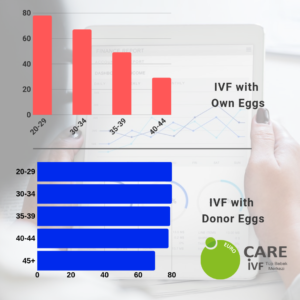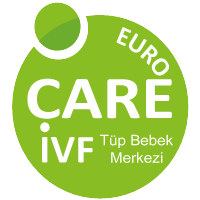 Thousands of couples every year are affected by secondary infertility. You and your partner may be one of them. Perhaps you have experienced no difficulty conceiving a first or second child, but you are not able to get pregnant again.
Thousands of couples every year are affected by secondary infertility. You and your partner may be one of them. Perhaps you have experienced no difficulty conceiving a first or second child, but you are not able to get pregnant again.
There’s a common misconception that secondary infertility isn’t that challenging if you already have a child. But the feeling of agony and the desire for a second child — are no different.
What is Secondary Infertility?
Secondary infertility is defined by a couple who has one or more children conceived naturally, who cannot birth another child without the help of assisted reproductive technology.
It is diagnosed when women under the age of 35 have been trying to get pregnant with no success for a year or when women over the age of 35 have been trying for six months. Secondary infertility accounts for 30 percent of infertility cases.
What is the Difference between Primary and Secondary Infertility?
- Primary infertility refers to the cases when couples have been trying to conceive with no success for at least 1 year without using birth control methods.
- Secondary infertility is when a couple has been able to conceive a child in the past, but are unable to do it again.
Causes of Secondary Infertility
Secondary infertility may be a result of the same conditions that cause primary infertility in both women and men.
Female Infertility
Female infertility may be caused due to:
Poor egg quality
One of the major causes of infertility is poor egg quality due to an increase in woman’s age. Regardless of whether a woman has conceived in the past, egg quantity and quality decline with age. Fertility in women starts to drop in your mid-30s. It’s a big difference if you conceived your first child in your early 30s, and are trying again in your late 30s or early 40s. Although you may physically feel like the same person, your ovaries have changed a lot during that time. Your chance of getting pregnant with your own eggs has substantially decreased due to a decline in quality.
Diminished ovarian reserve
Ovarian reserve is the reproductive potential of your ovaries to produce egg cells each month. Ovarian reserve levels are highest in younger women. Diminished ovarian reserve or low egg supply means that the number of eggs in your ovaries is becoming very low. Aging is the primary cause of diminished ovarian reserve. Here at euroCARE IVF Clinic in North Cyprus, we measure a woman’s ovarian reserve using hormone tests and ultrasound imaging.
Ovulation Disorders
Ovulation disorder is a menstrual disturbance that may result as a loss of infrequent ovulation. It is estimated that 25 percent of couples have difficulty conceiving due to an ovulation disorder. Polycystic Ovarian Syndrome (PCOS) is a type of ovulation disorder that is caused by elevated androgen levels. As a result, you may experience prolonged, irregular or no menstrual periods. Moreover, if you gained weight after your first pregnancy you may find it hard to conceive the second time. Excessive weight increases the levels of leptin, a hormone that is produced in fatty tissue. This can disrupt your hormone balance and lead to ovarian dysfunction.
Uterine factors
Congenital abnormalities including an absence or unusual shape of the uterus makes natural conception and pregnancy impossible. Pelvic adhesion or scar tissue, which may be a result of endometriosis, previous surgery or infection, can affect the proper function of the uterus including the egg release, fertilization and implantation. Polyps, fibroids and scarring are another factor that can prevent implantation of embryos.
Tubal abnormalities
Fallopian tubes are the place where the egg and sperm combine and achieve fertilization. Disorders of the fallopian tubes lead to the inability to conceive. A blockage in the tubes may be caused by previous surgery, pelvic infection or endometriosis.
Male Factor Infertility
Sperm issues
There are many factors that can contribute to male infertility. Abnormalities in sperm morphology, motility and count can affect sperm quality and quantity. Structural abnormalities of the reproductive tract can block the flow of sperm. Problems with the sperm production inhibit the process of formation of sperm.
Secondary Infertility Tests
Testing for secondary infertility is the same as testing for primary infertility. Both you and your partner are required to undergo fertility testing.
Female Infertility Testing
Female fertility is evaluated through blood tests and ultrasound. A sample of your blood can be tested for the following hormones:
- Anti Müllerian Hormone (AMH) is a good indicator of your ovarian reserve. A high AMH level indicates a good egg supply.
- Follicle Stimulating Hormone (FSH). A high FSH level is associated with diminished ovarian reserve and poor fertility.
- Estradiol (E2). Estradiol is a hormone that is secreted by the ovarian follicles and is used to measure your ovarian reserve.
- Thyroid Stimulating Hormone (TSH) is used to detect problems with your thyroid gland. If the TSH level is higher than 2.5, appropriate medication will be prescribed to lower the hormone levels.
- Prolactin is another hormone that is responsible for the egg production and the preparation of the uterus for implantation. Even slightly raised levels of prolactin can interfere with the ability of the embryos to attach to the uterine lining.
- Antral follicle count (AFC). AFC scan is carried out before your treatment in Cyprus to determine the number of follicles (eggs) in your ovaries. The scan also checks for any anomalies of the uterus that can lead to failed implantation and unsuccessful treatment.
Additional testing for HIV, HBsAg, and Anti-HCV may be required prior to your fertility treatment in Cyprus.
Male Infertility Testing
Semen Analysis
Semen analysis is a fertility test that measures the sperm count of the male partner. The test determines the quantity and quality of sperm, and is done when our North Cyprus fertility specialist suspect that your partner might have a fertility issue. Other male fertility tests may be required before you and your partner arrive in Cyprus.
Secondary Infertility Treatment
Based on the test results, you and your partner may be recommended a few treatment options including intrauterine insemination, IVF, sperm donation or egg donation.
- Intrauterine insemination (IUI) Cyprus is a fertility treatment that involves placing the sperm into the woman’s uterus in order to achieve pregnancy. The sperm sample is prepared in advance in our laboratory. Injecting a large quantity of sperm into the uterus improves the chances of the egg being fertilized.
- IVF (In Vitro Fertilization) Cyprus is another assisted reproduction technique that follows multiple steps including ovarian stimulation, egg and sperm retrieval, fertilization, and embryo transfer. The fertilization of the eggs is carried out by Intracytoplasmic Sperm Injection (ICSI) Cyprus in our lab.
- Sperm donation Cyprus is considered in cases when the male partner has sperm issues that may affect the woman’s ability to conceive. Sperm donation is the process of donating sperm by a healthy male with very high-quality semen to individuals and couples to help them become parents.
- Egg donation Cyprus is an option when a woman cannot conceive with her own eggs. In this case, donor eggs are combined with the father’s (or donor) sperm in our lab in order to produce embryos. The resulting embryos are cultured, graded and selected for transfer. Egg donation is usually recommended for older women, women with ovarian failure or woman with repeated failed IVF cycles or miscarriage.
IVF for secondary infertility
IVF in Cyprus is recommended when you or your partner struggle with infertility and after you have tried other alternative treatments with no success. Here is a short video explaining what is IVF in Cyprus:
The IVF process involves multiple steps, including:
- Ovarian stimulation. For about 8 days you will take fertility drugs to stimulate your ovaries to develop multiple eggs for fertilization. You also need to take additional medication to suppress your natural ovulation. Once the ovarian stimulation is done, you will come to our clinic in Cyprus, where you’ll be able to continue your IVF treatment.
- Egg development. Here in Cyprus you will be required to have blood tests and ultrasound scans to check your egg development. This allows our fertility doctor to monitor your ovaries and track the growth of your eggs.
- hCG injection. When the follicles are ready, you will be administered a hCG injection, also known as a “trigger shot” to stimulate the final maturation of your eggs. 34 to 36 hours after the trigger shot, your eggs will be retrieved using ultrasound guided aspiration.
- Egg retrieval. Our fertility doctor will give you an anesthetic and will insert an ultrasound probe to visualize the follicles. A thin needle is then inserted through the vagina to retrieve the eggs from the follicles in the ovaries. This is a painless procedure that takes about 15 min.
- ICSI (Intracytoplasmic sperm injection). Our embryologist will examine your eggs before combining them with your partner’s sperm. Abnormal eggs may not be fertilized. Good quality eggs are fertilized with the sperm in our lab. With ICSI, a single sperm is injected directly into each collected egg.
- Embryo grading and selection. The embryologist grades the embryos based on their quality. The most viable embryo(s) are selected and transferred with catheter to your uterus on day 3 or day 5 after egg retrieval. Extra embryos may be frozen for future IVF cycles.
- Pregnancy. 12 days after the embryo transfer you’ll need to do a beta hCG test to confirm your pregnancy.
Secondary Infertility IVF Success Rates
The good news is that women who have already had a child are more likely to have success with fertility treatments and get pregnant again. In cases when the woman cannot conceive with her own eggs, she can use healthy donor eggs as part of our egg donation program.
The average success rate for IVF with own eggs ranges between 65 and 75 percent for women under 35, and between 35 and 51 percent for women over 35. IVF with donor eggs Cyprus has slightly higher success rates, which can be as high as 80 percent for women under 35 — and for women over 35 the pregnancy rate is 70 percent.
Discuss your options
Many couples are too afraid, humiliated or overwhelmed to ask the most important questions related to secondary infertility. The euroCARE IVF staff is here to help you. Whatever questions you have — we want you to ask as our fertility doctor has probably heard it before and you are not alone in this.
Whether you’re just beginning your fertility journey or if you’ve been on this journey for awhile, we’re here for you. If you have any questions about fertility treatments or just general questions about infertility — we’re here to help. Please do not hesitate to reach out to us and remember, you are never alone!
Click here to schedule an appointment with out patient coordinators.
Resources:
